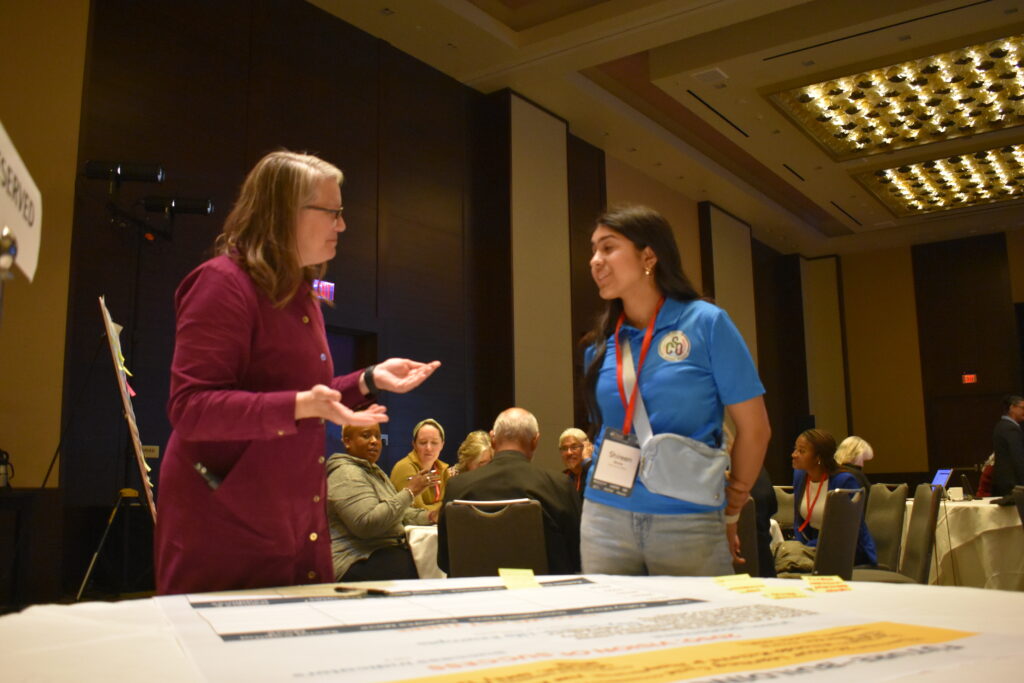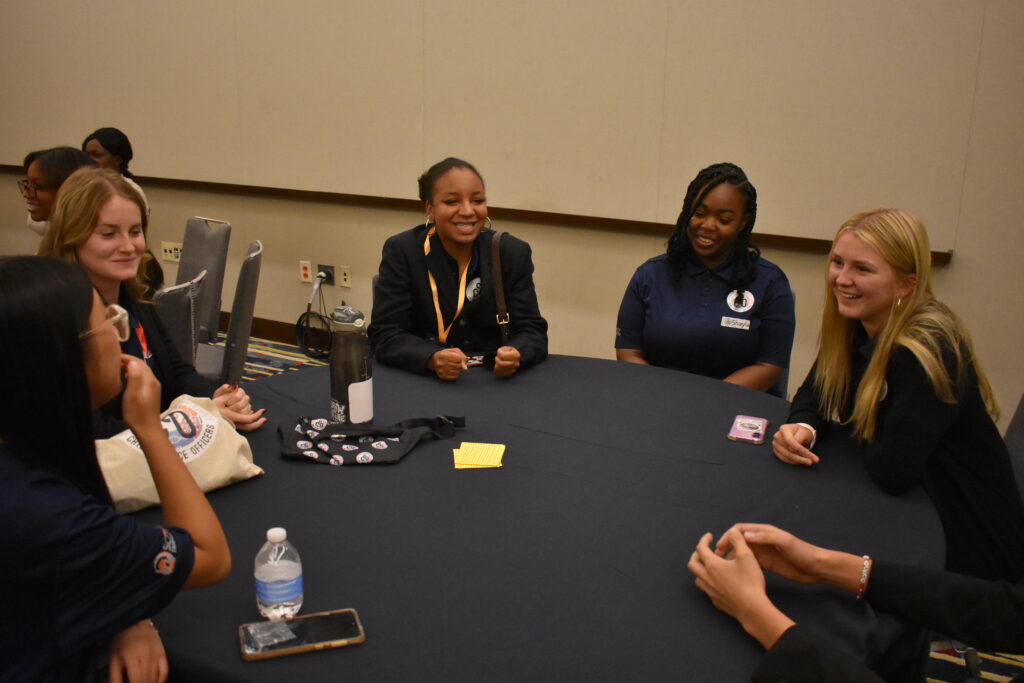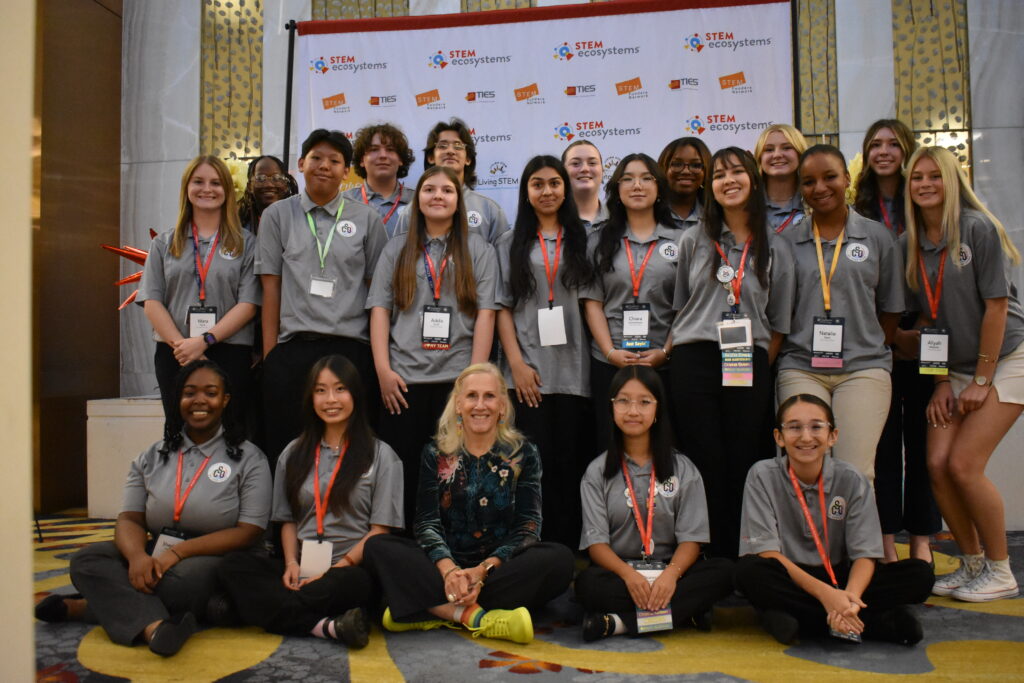When a group of student leaders from across the country gathered in Washington, D.C. for the STEM Learning Ecosystems Community of Practice (SLECoP) 2025 Convening, they didn’t just attend — they led. These students, known as Chief Science Officers (CSOs), represented the next generation of STEM thinkers, problem-solvers, and innovators through involvement in event sessions and even presenting on their own work in STEM spaces. And if you ask them, their takeaways were more than worth the effort.
Making Connections That Matter

For many CSOs, the event opened a whole new world of networking and collaboration.
Natalie from Northeast Florida shared, “Networking is incredibly important — you can learn so much from simply talking to others who share your passion.”Her twin sister, Natasha, agreed: “Connections are important. Meeting adults in my future field helped me see where I want to go.”
Both students found themselves surrounded by educators, scientists, and ecosystem leaders eager to hear their perspectives. It was a reminder that in STEM, conversations between generations can spark lasting change.
The Bigger Picture
For Mara from Pennsylvania, the trip offered a new way to see her role as a student ambassador. “I can bring back ideas for STEM activities and networking events,” she said. “It helped me understand how connected all these ecosystems really are.”
The convening gave CSOs a chance to learn how organizations, schools, and communities work together to strengthen STEM education. Many returned home with fresh ideas for their own Action Plans, which are projects that bring hands-on STEM experiences to their schools and communities.
Confidence Through Experience
While every CSO started their journey at a different point, nearly all of them left D.C. feeling more confident.
Before the trip, many rated themselves as a 3 or 4 out of 5 in confidence as STEM ambassadors. Afterward, those same students almost universally rated themselves a 5 out of 5.
Elizabeth from Florida summed it up best: “Networking with other ecosystems and meeting new people showed me that what I’m doing locally connects to something much bigger.”

That realization that local STEM efforts are part of a national movement gave students both purpose and pride.
Inspiring Next Steps
Isaac from Ohio said the most impactful part of his trip was “meeting people who are genuinely interested in hearing what students think.” He added, “It inspired me to do more work in my community and keep pushing my Action Plan forward.”
That motivation is exactly what the CSO program is all about: empowering young leaders to identify STEM needs in their own schools or neighborhoods and take action. Whether they’re organizing STEM nights, creating STEM kits, or mentoring younger students, CSOs are turning their ideas into impact.
Student Spotlight Snapshots
CSOs shared some of their standout reflections from the trip:
- Natalie (Northeast Florida): “Networking is incredibly important — you can learn so much from people you just met.”
- Mara (Pennsylvania): “I can bring back ideas for STEM activities and make stronger connections between regions.”
- Elizabeth (Florida): “It reminded me that we’re part of something bigger than just our school… a national STEM effort.”
- Isaac (Ohio): “Meeting people who value student voices showed me how powerful our input can be.”
- Natasha (Northeast Florida): “It’s amazing seeing how many adults are invested in helping us succeed.
The Power of Student Voice

The Chief Science Officers didn’t just attend SLECoP, they contributed to it. CSO Donna and CSO King from California led a breakout session called “Work-Based, Future-Focused: CSOs in the Driver’s Seat,” demonstrating the effectiveness of students taking an active interest and role in their academic and career planning. Their ideas and reflections, along with those of their peers, added depth to conversations about the direction of STEM education. For organizers, it showed that true ecosystem work includes voices from every level, especially the students affected by it.
As one CSO put it, “It reminded me to keep pursuing my project even when I face challenges. STEM isn’t just a subject — it’s a way of thinking.”
This mindset of curiosity, persistence, and community is what will carry these young leaders forward as they continue to shape the future of STEM in Arizona and beyond.
Interested in supporting youth leadership in STEM?
Learn more about the Chief Science Officers Program and how it amplifies student voice across the STEM Ecosystem at www.chiefscienceofficers.org